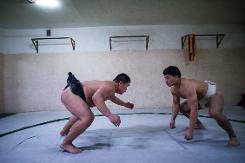ULAN BATOR - The slapping sound of colliding flesh reverberates through a basement in Mongolia's capital, as Tsogt-Erdeniin Mendsaikhan hones fighting skills in pursuit of his dream -- sumo wrestling in Japan.
The teenager is inspired by Hakuho, a Mongolian grand champion, or "yokozuna", who in January broke a more than four decade-old record when he won his 33rd Emperor's Cup, awarded to the champion of the bi-monthly top tournament.
The feat was "absolutely amazing", said Mendsaikhan, clad in a black loincloth, or mawashi, at a practice session at Ulan Bator's sole amateur sumo wrestling club.
"A Mongolian reached the peak of Japanese sumo and raises it higher and higher."
Kublai Khan's attempts to subdue Japan more than 700 years ago failed when "divine winds" -- or "kamikaze" -- are said to have scattered his ships, but over the past quarter century a new invasion has seen Mongolian wrestlers take over the country's proud national sport.
No Japanese has won a top division tournament for nine years, and all three rikishi, or wrestlers, currently ranked as yokozuna are Mongolian. The last Japanese to hold the coveted title, Takanohana, retired in 2003.
Yokozuna must not only be adept at slamming opponents out of the dohyo, the mound of clay and sand that serves as a ring.
Sumo is heavily imbued with the values of Japan's indigenous Shinto religion and yokozuna perform rituals in the ring and out, including one for the New Year at Tokyo's Meiji Shrine, donning a sacred white rope, clapping their hands and slapping their bare feet onto the ground.
When foreigners first approached the sport's pinnacle in the 1990s, conservative voices asked whether they had sufficient understanding of the country's culture and manners -- often described as "hinkaku", or dignity -- to fulfil that traditional role.
Such sentiments are heard less frequently now, although Hakuho found himself at the centre of controversy earlier this year for taking issue with a judge's decision -- a sumo no-no.
Still, Japanese schoolteacher Yuko Asakawa said the Mongolians have helped to revive sumo's popularity.
"Hakuho is performing with quite a lot of dignity, very similar to Japanese," she added.
"Of course, as Japan's national sport it's better if there are a lot of Japanese," she said outside the sport's premier venue in Tokyo, where the latest tournament in May was again won by a Mongolian.
- 'Hungry spirit' -
Mongolians are not the only foreigners active in sumo, with current rikishi from as far afield as Bulgaria and Brazil, but except for two -- from Hawaii and American Samoa -- who became the first foreigners to reach yokozuna in the 1990s, none have had the success of the hulking heroes of the Mongolian steppe.
Sumo is said to date back some two millennia in Japan, while there are variants of traditional wrestling across Asia -- a similar activity is depicted in bas relief at Angkor in Cambodia, and in tomb art of the ancient Koguryo kingdom in what is now the Korean peninsula and northeast China.
In Mongolia, the country’s traditional form of wrestling -- or "bokh" -- is a revered national sport, known as one of the "three manly skills" along with archery and horsemanship. It also carries a spiritual side, with grapplers performing a pre- and post-match "eagle" dance, flapping their arms in symbolic flight.
But the Mongolians' dominance in Japan has prompted soul-searching akin to English self-doubt around their team's perennial failure to win football's World Cup.
Retired Japanese rikishi Shuhei Mainoumi published a book last month titled "Why Can't Japanese Become Yokozuna?"
He says the youth of his country have grown soft in one of the world's richest societies and lost the drive that Mongolians retain.
Sumo winnings may be modest compared with other professional sports, but can go far in Mongolia's smaller and still developing economy, he adds.
"Unlike Japanese, they have a hungry spirit," he wrote.
- 'Japan dream' -
Some wrestlers have returned to Mongolia, leveraging their Japan experience into prominent careers outside the sport.
Davaagiin Batbayar, who competed as Kyokushuzan until 2006, went into politics, serving in parliament before becoming a special adviser on Japan to Prime Minister Chimediin Saikhanbileg.
He reckons there are currently about 25 Mongolian wrestlers, including Hakuho, that he has sent to Japan. Still, he cautions that for many post-sumo life can be tough.
"They are so respected in Japan and then come back to being regular people in Mongolia," he told AFP.
"People will just say, 'ah, so-and-so was a sumo wrestler,'" he added, stressing they must work hard and develop themselves beyond the sport.
Mongolia's first yokozuna Dolgorsurengiin Dagvadorj, who wrestled as Asashoryu, won 25 championships and now concentrates on business interests, including banking.
His tumultuous career was cut short after outside-the-ring scandals, though he stresses his time in Japan left a lasting impression.
Wrestlers are exposed to values such as trust, honesty, punctuality and diligence there, he told AFP. "There are many things Mongolia can learn from Japan."
He also stressed that sumo carries aspirations for Mongolians as baseball does for Japanese pitchers and sluggers pursuing their "American Dream" in the US Major Leagues.
"The 'Japan Dream' for Mongolian boys is sumo. It's the same."








0 comments:
Post a Comment